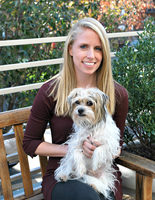
I was born in Washington D.C., but I grew up in Toronto, Ontario. Then moved to a suburb just outside Philadelphia. I received my undergraduate degree from Duke University, where I double majored in French studies and Biology with a focus in marine biology.
I attended veterinary school at the University of Florida, where I gained a passion for comparative oncology and small animal internal medicine. Following vet school, I completed a 1-year rotating internship in medicine and surgery at Friendship Hospital for Animals, followed by a 3-year medical oncology residency program with The Oncology Service.
I live in D.C. with my scruffy mutt named Mowgli, whom I adopted during veterinary school. I enjoy running, hiking, biking, and generally being outdoors. I am very excited to rejoin the Friendship Hospital for Animals team!
Clinical Areas of Interest
- Hematopoietic cancers
- I also enjoy participating in clinical trials exploring new treatments for dogs and cats with cancer.
Why Do You Work at Friendship?
I did my rotating internship at Friendship and stayed on to complete a three-year residency with the oncology department. I love working here because there is such a diverse knowledge base within the hospital which allows for a truly collaborative approach to patient care. The doctors and staff are great to work with, which also creates a great work environment.
Education
- Duke University, B.S. Biology, B.A. French Studies
- University of Florida, College of Veterinary Medicine, DVM, Cum Laude with Honors
- Friendship Hospital for Animals, Rotating Intern in Small Animal Medicine, Emergency, and Surgery
- The Oncology Service, LLC, Resident Medical Oncology
Board Certifications
- Diplomate, American College of Veterinary Internal Medicine (Oncology)
Publications and Research
-
Foskett A, Alnaeeli M, Wang L, Teng R, Noguchi CT. The effects of erythropoietin dose titration during high-fat diet-induced obesity. J Biomed Biotechnol. 2011;2011:373781. doi: 10.1155/2011/373781. Epub 2011 Apr 20. PMID: 21541227; PMCID: PMC3085386.
-
Foskett A, Khanna C. “The Hallmarks/Origin of Cancer”. Textbook of Veterinary Internal Medicine. Elsevier, December 2016.
-
Foskett A, Manley C, Naramore R, Gordon IK, Stewart BM, Khanna C. Tolerability of oral sorafenib in pet dogs with a diagnosis of cancer. Vet Med (Auckl). 2017 Dec 8;8:97-102. doi: 10.2147/VMRR.S149678. PMID: 30050861; PMCID: PMC6042486.
-
Hanratty B, Hauck A, Foskett A, Foster JD. Leukoreduction in a dog with acute leukemia. J Vet Intern Med. 2025 Jan-Feb;39(1):e17283. doi: 10.1111/jvim.17283. PMID: 39701557; PMCID: PMC11658807.
-
Foskett A. “The Hallmarks/Origin of Cancer”. Textbook of Veterinary Internal Medicine. Elsevier, January 2024.
